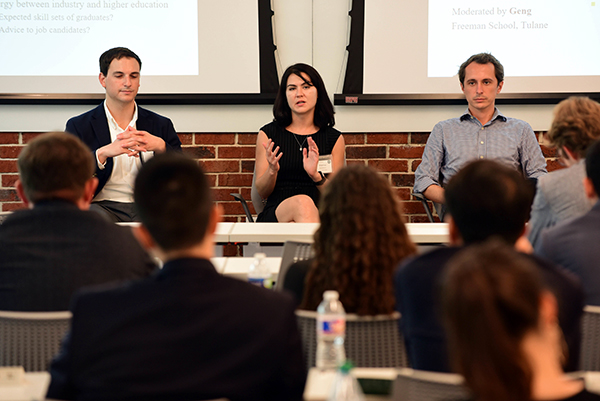
Marina Brazhnikova, center, data visualization supervisor at Ochsner Health Systems, spoke about the role of data analytics at Ochsner as part of a panel discussion at the inaugural Tulane Business Analytics Colloquium.
About a dozen data professionals from leading New Orleans companies came together in October to share insights and discuss industry trends at the inaugural Tulane Business Analytics Colloquium.
The Freeman School presented the colloquium to explore how companies in New Orleans are using analytics to solve problems and create business value. Participants had the opportunity to interact with peers and share best practices as well as meet faculty and students from the Freeman School’s newly launched Master of Business Analytics program.
“Many in the profession want to know what’s next for analytics, so the colloquium was a chance for them to learn from their peers,” said colloquium organizer Xianjun Geng, professor of management science and executive director of the Master of Business Analytics program.
The centerpiece of the colloquium was a panel discussion moderated by Geng featuring Gino Picozzi (BSM ’13), lead business analyst with Premium Parking, Marina Brazhnikova, data visualization supervisor with Ochsner Health System, and Julien Urraca, senior manager of Marketplace Operations with Lucid. The panelists discussed how analytics influences decision making in their organizations, what tools and techniques they use, and what trends they’re watching.
“It’s really great to see that Tulane is moving into more technical areas and more computer science-driven fields,” said Picozzi. “When it comes to business, that’s where it’s all headed.”
The colloquium also featured a discussion of the Freeman School’s Master of Business Analytics curriculum by Ricky Tan, assistant professor of management science, and a special presentation by business analytics students, “Data Visualization Analysis for NOPD,” which showcased the results of the recent project the students completed for the New Orleans Police Department.
According to Geng, the colloquium succeeded on a number of levels. In addition to providing a forum for analytics professionals to discuss industry topics, it served as an introduction to the Freeman School’s business analytics program and laid the groundwork for future collaborations, such as having students work on data analysis projects for the participating companies.
“For the professionals, I think the value was learning from peers and also learning that they can utilize our students as a resource to help them achieve goals that they may not have the resources to do,” Geng said. “For our students,ultimately gaining experience by working on projects for them. It was a win-win for everyone involved, so that’s something I’m very excited about.”

